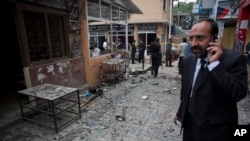ISLAMABAD —
Pakistani police have registered a case of blasphemy against 68 lawyers who made a public protest after a police officer detained one of their colleagues, officials said on Tuesday, the latest in a tidal wave of such accusations flooding the country.
Analysts say the surge in accusations is a worrying sign the nuclear-armed nation of 180 million people is becoming less tolerant as militant ideas enter mainstream politics.
The colonial-era law does not define blasphemy, but the charge carries the death penalty. Presenting evidence can be considered a new infringement, so judges are reluctant to hear cases.
Judges who free those accused of blasphemy have been attacked and two politicians who suggested reforming the law were shot dead. Those acquitted have often been lynched.
Monday's charges followed a protest in which lawyers shouted slogans against senior police officer Umar Daraz for allegedly illegally detaining a lawyer in the Jhang district of central Pakistan.
“Lawyers were protesting against police, using foul language and the name of the inspector,” the district's police officer, Zeeshan Asghar, told Reuters.
One of the companions of the Prophet Muhammad, founder of the Islamic religion, was called Hazrat Umar.
A member of a far-right sectarian party complained his religious feelings were offended because the lawyers used the name “Umar” in their protest, and lodged charges with police.
Blasphemy accusations have spiked in Pakistan recently, a 2012 study by the Islamabad-based think tank, the Center for Research and Security Studies, showed, with 80 complaints in 2011, up from a single case in 2001.
More recent figures are not available.
Analysts say blasphemy allegations are increasingly used to settle feuds or grab property. There is no penalty for false accusations.
Pakistan has not yet executed anyone for blasphemy, but members of religious minorities say they are often threatened with such accusations.
Last week a respected human rights lawyer was killed after facing threats in court for defending a university professor whose students had accused him of blasphemy. It had taken the jailed professor a year to find a lawyer ready to defend him.
Police said the man who lodged Monday's case was a member of the Ahle Sunnat Wal Jamat, a front for a banned Sunni sectarian group linked to the deaths of hundreds of minority Shi'ite Muslims and led by politician Maulana Ahmed Ludhianvi.
Pakistan is a mostly Sunni Muslim country but about a fifth of its people are Shi'ite Muslim, who have been targeted in violence recently.
The president of the Jhang Bar Association said the body hoped Ludhianvi, who had expressed displeasure at the protest, would ask his supporter to withdraw the case.
“The issue has been settled now,” said Meher Afzal Khan. “We have assured Mr. Ludhianvi that there was no mischief on our part. It was all a misunderstanding.”
Analysts say the surge in accusations is a worrying sign the nuclear-armed nation of 180 million people is becoming less tolerant as militant ideas enter mainstream politics.
The colonial-era law does not define blasphemy, but the charge carries the death penalty. Presenting evidence can be considered a new infringement, so judges are reluctant to hear cases.
Judges who free those accused of blasphemy have been attacked and two politicians who suggested reforming the law were shot dead. Those acquitted have often been lynched.
Monday's charges followed a protest in which lawyers shouted slogans against senior police officer Umar Daraz for allegedly illegally detaining a lawyer in the Jhang district of central Pakistan.
“Lawyers were protesting against police, using foul language and the name of the inspector,” the district's police officer, Zeeshan Asghar, told Reuters.
One of the companions of the Prophet Muhammad, founder of the Islamic religion, was called Hazrat Umar.
A member of a far-right sectarian party complained his religious feelings were offended because the lawyers used the name “Umar” in their protest, and lodged charges with police.
Blasphemy accusations have spiked in Pakistan recently, a 2012 study by the Islamabad-based think tank, the Center for Research and Security Studies, showed, with 80 complaints in 2011, up from a single case in 2001.
More recent figures are not available.
Analysts say blasphemy allegations are increasingly used to settle feuds or grab property. There is no penalty for false accusations.
Pakistan has not yet executed anyone for blasphemy, but members of religious minorities say they are often threatened with such accusations.
Last week a respected human rights lawyer was killed after facing threats in court for defending a university professor whose students had accused him of blasphemy. It had taken the jailed professor a year to find a lawyer ready to defend him.
Police said the man who lodged Monday's case was a member of the Ahle Sunnat Wal Jamat, a front for a banned Sunni sectarian group linked to the deaths of hundreds of minority Shi'ite Muslims and led by politician Maulana Ahmed Ludhianvi.
Pakistan is a mostly Sunni Muslim country but about a fifth of its people are Shi'ite Muslim, who have been targeted in violence recently.
The president of the Jhang Bar Association said the body hoped Ludhianvi, who had expressed displeasure at the protest, would ask his supporter to withdraw the case.
“The issue has been settled now,” said Meher Afzal Khan. “We have assured Mr. Ludhianvi that there was no mischief on our part. It was all a misunderstanding.”





